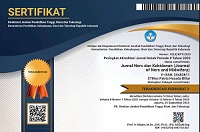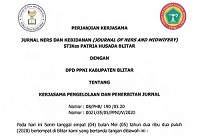Anemia in Pregnant Women Correlated with The Estimated Fetal Weight
DOI:
https://doi.org/10.26699/jnk.v11i1.ART.p068-074Keywords:
anemia, anemia in pregnant women, pregnancy, estimated fetus weightAbstract
During pregnancy, the body's need for oxygen increases, causing an increase in erythropoietin production. An increase in plasma volume has an effect on fluid retention and blood dilution in pregnancy, causing a decrease in hematocrit, causing a decrease in Hb concentration and causing anemia. One possible impact is hampering fetal growth and development. The development of the fetus in the womb can be monitored by estimating the fetus's weight to detect fetal growth abnormalities early. This study aimed to understand the correlation between anemia in pregnant women and estimated fetal weight in the working area of the Sambi Health Center, Kediri Regency. The design of the study was cross-sectional, with a sample of 34 pregnant women with anemia. The sampling technique applied consecutive sampling. The instruments of the study were met line, Sysmex hematology analyzer and observation sheet. The results of this study were analyzed using the Kendall Tau test, and obtained a ρ value of 0.03˂α 0.05, namely H0 was rejected so that there was a correlation between anemia in pregnant women and the estimated weight of the fetus in the working area of the Sambi Community Health Center, Kediri Regency. When a pregnant woman experiences anemia, it results in disturbances in metabolism and exchange of substances in the tissues, then the placenta shrinks, resulting in a decrease in the transfer of important nutrients for the growth and development of the fetus. The impact of this situation is a slowdown in fetal growth which results in a low estimated fetal weight.
References
Prawirihardjo, S. (2016). Ilmu Kebidanan. Yayasan Bina Pustaka.
WHO. (2019). Prevalence of anemia among pregnant women (%)-IndonesiaPrevalence of anemia among pregnant women (%)-Indonesia. https://data.worldbank.org/indicator/SH.PRG.ANEM?end=2019&locations=ID&name_desc=false&start=2001
Indonesia, P. K. (2021). Profil kesehatan indonesia.
Kediri, D. K. (2020). Profil Kesehatan Kabupaten Kediri Tahun 2020.
Astuti, H, P. (2012). Buku ajar asuhan kebidanan ibu I (kehamilan). Rohima press.
Astutik, R, Y., Ertiana, D. (2018). Anemia dalam kehamilan. Pustaka abadi.
Herawati, N., Herinawati, Wuryandari, A. G., Simanjuntak, R. E. M. M., & Jannah, M. (2022). Perbandingan Ketepatan Formula Risanto dan Johnson Toshack dalam Menentukan Taksiran Berat Janin. Jurnal Akademika Baiturrahim Jambi, 11(2), 331. https://doi.org/10.36565/jab.v11i2.592.
Hermawati, E., Atit, T., & Etin, R. (2018). AKURASI TAKSIRAN BERAT BADAN JANIN DAN BAYI BARU LAHIR MENURUT JOHNSON THAUSACK DAN POSISI SEMI FOWLER. Media Informasi, 14(1), 0–5. https://doi.org/https://doi.org/10.37160/bmi.v14i1.164.
Jung, J., Swe, K. T., & Akter, S. (2019). Effects of hemoglobin levels during pregnancy on adverse maternal and infant outcomes : a systematic review and meta-analysis. New York Academy of Sciences., 1–14. https://doi.org/10.1111/nyas.14112.
Khairunnisa Latifa., Wiyati Putri Sekar., A. D. A. (2019). Hubungan penambahan Berat Badan Ibu Selama Hamil dengan Berat Badan Lahir Bayi. Jurnal Kedokteran Diponegoro, 8(2), 92–97.
Kurdanti, W., Khasana, T. M., & Wayansari, L. (2020). Lingkar lengan atas, indeks massa tubuh, dan tinggi fundus ibu hamil sebagai prediktor berat badan lahir. Jurnal Gizi Klinik Indonesia, 16(4), 168. https://doi.org/10.22146/ijcn.49314.
Kusumawati, D., & Hariyani, W. F. (2017). Analisis Kadar Hemoglobin Pada Ibu Hamil Trimester III Terhadap Taksiran Berat Janin. Healty, 6(1), 13–18.
Metasari Andi ria., kasmiati., E. (2022). Hubungan Lingkar Lengan Atas (LILA) dan Kenaikan Berat Badan Ibu Hamil Dengan Taksiran Berat Janin. Jurnal Ilmiah Kesehatan, 15(1), 23–29. https://doi.org/10.48144/jiks.v15i1.668.
Mulianisaa, R., Tunggal, T., & Suhrawardi. (2021). Studi Literatur Hubungan Anemia dan KEK pada Ibu Hamil dengan Kejadian BBLR. Jurnal Kebidanan Bestari, 5(2), 2021. http://www.ejurnalbidanbestari-poltekkesbjm.com.
Saputro, A. A., & Lestari, C. R. (2022). Analisis Status Gizi Dan Kadar Hemoglobin Terhadap Taksiran Berat Janin Pada Ibu Hamil Trimester III. Jurnal Kesehatan Masyarakat Celebes, 03(03), 12–18. https://doi.org/https://doi.org/10.1017/S2040174415001439.
Sayekti, S., & Sari, E. P. (2023). Hubungan kadar hemoglobin dengan taksiran berat badan janin pada ibu hamil trimester iii di puskesmas kedungadem bojonegoro. Jurnal Insan Cendekia, 10(2), 137–146.
Sikoway, S., Mewo, Y., & Assa, Y. (2020). Gambaran Kadar Hemoglobin pada Ibu Hamil Trimester III di Rumah Sakit Robert Wolter Mongisidi Manado. Medical Scope Journal, 1(2), 82–85. https://doi.org/10.35790/msj.1.2.2020.28004.
Utami, P., Zulkifli, H., Hasyim, H., Ilmu, F., Masyarakat, K., & Sriwijaya, U. (2021). Analisis Determinan Taksiran Berat Janin pada Ibu Hamil. Jurnal Ilmiah Kesehatan, 3(3), 217–227. https://doi.org/https://doi.org/10.36590/jika.v3i3.207.
Wasono, H. A., Husna, I., Zulfian, & Mulyani, W. (2021). HUBUNGAN TINGKAT PENDIDIKAN DENGAN KEJADIAN ANEMIA PADA IBU HAMIL DI BEBERAPA WILAYAH INDONESIA. Jurnal Ilmu Malahayati, 5(1), 59–66.
Downloads
Published
How to Cite
Issue
Section
License
Copyright (c) 2024 Jurnal Ners dan Kebidanan (Journal of Ners and Midwifery)

This work is licensed under a Creative Commons Attribution-ShareAlike 4.0 International License.






